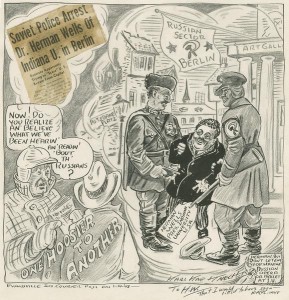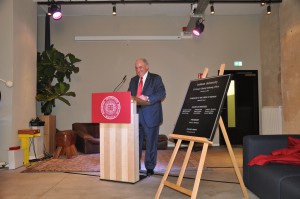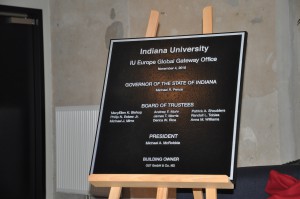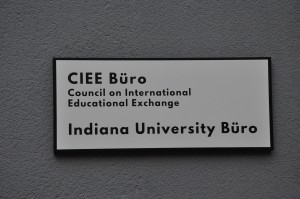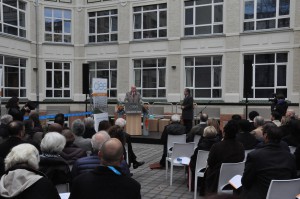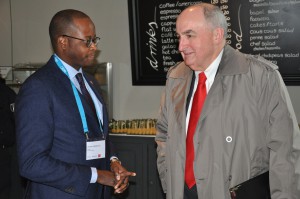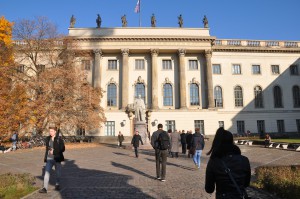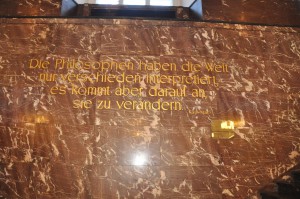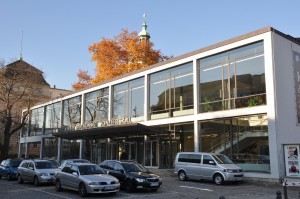Looking back at a historic trip
It’s hard to believe it’s been more than a month since an Indiana University delegation, led by President Michael A. McRobbie, made a historic trip to Berlin, burnishing the university’s longstanding tradition of global engagement and launching new initiatives, including the IU Europe Gateway office, that will ensure that IU faculty and students have greater access to opportunities all across Europe in the new year and beyond.
The renewal of historic partnerships, initiation of new collaborations, meetings with students, faculty, alumni and friends, and creation of a new central hub for IU activities in Europe all added up to a productive and memorable trip, neatly captured in this short highlights video.
Enjoy this look back at IU’s time in Berlin, and happy holidays!
Tags: Berlin, Germany, IU Europe Gateway, IU Global Gateway Network, Michael A. McRobbie
History, reinvention and the building of new bridges in Berlin
One couldn’t have bookended any better the IU delegation’s final and hugely historic day of business in Berlin.
The morning began with a 20-minute drive from downtown Berlin to the residential district of Dahlem in the southwestern section of the city, home to Freie Universität Berlin, or Free University of Berlin.
As I’ve briefly touched upon in this blog space, IU and Free University have had a uniquely historic relationship dating back nearly 70 years.
Shortly after the end of World War II, in fall 1947, IU’s legendary 11th president Herman B Wells left Bloomington, Ind., for Berlin at the request of an American military commander charged with helping to rebuild the devastated city, including a system of higher education that had previously been the envy of the world. During his time in Berlin, at the inception of what would soon be known as the Cold War, Wells met with university student demonstrators retaliating against Soviet influence, as well as with professors, politicians, journalists and others sympathetic to their cause. (He himself was famously, albeit briefly, arrested by Soviet police when he sought to look in on a group of German school children. The incident is depicted in a cartoon housed in the IU Archives.)
Wells’ interviews and first-hand assessment of the damaged condition of higher education in Germany led him to champion the establishment of a “free university” in western Berlin, which became a reality a year after Wells had arrived in the capital city. By 1949, Free University had already registered around 5,000 students, including some who came from the Soviet sector of the city and were not yet blocked by the Berlin Wall, which wouldn’t be built for another dozen years.
That’s just part of the remarkable early history of Free University. On June 26, 1963, the same day he delivered his legendary “Ich bin ein Berliner” speech in support of West Germany, John F. Kennedy was named an honorary citizen by Free University and gave another speech on campus in which he addressed the future of Germany and Berlin. Robert Kennedy received an honorary degree from Free University in 1964 and gave a speech dedicated to his brother, who had been assassinated the previous year.
It was around this time that IU and Free University began an exchange of students, which continues to this day and is IU’s longest-running graduate exchange program.
IU’s relationship with Free University deepened its connections to Germany, which date back to the university’s founding nearly 200 years ago. When professor Karl von Jagemann joined the faculty in 1886, German became a major language at IU. Later, he went on to Harvard, where he trained many of the leading scholars in Germanic studies of the early 20th century. Today, the Department of Germanic Studies he helped to establish at IU is one of the leaders in the field and part of IU’s vast collection of educational expertise in the areas of European history, languages, politics and culture.
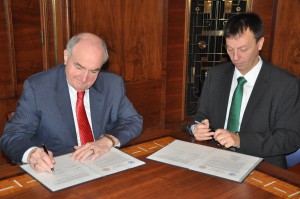
IU President Michael A. McRobbie, left, and Klaus Mühlhahn, vice president for international affairs at Free University Berlin, sign a renewed partnership agreement between their respective universities.
Beyond Berlin, the relationship also served as a taking-off point for IU’s transformation into a truly international university, one engaged in the world through its research and scholarship and its commitment to institution-building in countries all around the globe, such as Kenya, Liberia, Macedonia, Malaysia, South Sudan and Thailand.
This morning’s meetings between IU and Free University provided the leaders of both institutions with an opportunity to reaffirm their historic relationship, as they also explored new possibilities for collaboration, including student and faculty exchanges and the sharing of academic expertise to address what Free officials call “excellence clusters” and IU terms “grand challenges.”
Wells, who died in 2000, a little more than decade after the fall of the Berlin Wall, would be proud of just how closely connected IU and Free University have grown with regard to their core missions of education, research and greater international engagement. The two schools share a number of common academic strengths, including the humanities, the natural, life and social sciences, and area studies. Furthermore, both IU and Free University are among their respective nation’s top research universities, a status supported by IU’s membership in the prestigious Association of American Universities and Free University’s position as one of just nine German universities to win in the German Universities Excellence Initiative, a national competition for universities organized by the German federal government.
Indeed, Free University and IU have a great many successes and shared interests to build upon. To this end, leaders of both institutions concluded their meetings today by signing a renewed partnership between the two institutions, thus ensuring a future of increased cooperation and collaboration, and keeping alive the spirit of Wells.
A gateway to Europe and a great day for IU
After the morning meetings at Free University, members of the IU delegation returned to the heart of Berlin for a meeting with U.S. Ambassador to Germany John Emerson. Just 24 hours earlier, Emerson had participated, along with IU President Michael A. McRobbie, in the grand opening of the new Global Institute of the Council on International Educational Exchange, which both men lauded as a major development in increasing study abroad opportunities for university students of all backgrounds and promoting greater cultural understanding.
This afternoon, in an embassy conference room overlooking the city’s famed Brandenburg Gate and Reichstag building, Emerson also had high praise for IU’s efforts to increase its foothold in Germany and across Europe, and he pledged his firm support for the university’s new gateway facility in Berlin, housed within the CIEE Global Institute.
If the meetings at Free University served as an inspiring reminder of just how far IU has come as a true international institution, tonight’s formal inauguration of the new IU Europe Gateway signaled a future of even greater global engagement across the continent.
The new office, IU’s third such facility following the establishment of offices in Beijing and New Delhi, will serve as a first-ever home base for IU activities here in Europe, supporting scholarly research and teaching, conferences and workshops, study abroad programs, distance learning initiatives, executive and corporate training, alumni events and more.
“The IU Europe Gateway will give IU faculty and students greater access to opportunities in Europe; and at the same time, it will allow our students, alumni and university partners who are based in Germany and elsewhere in Europe to connect directly with IU in one of the most dynamic cities in the world,” McRobbie said at tonight’s event. “It also underscores IU’s belief that it is absolutely essential in this day and age that the education of all of our students includes an international dimension. By encouraging more IU students to study abroad, it will help to create global leaders, and it will support scholarship, research and international collaboration that will help future generations of American and European students succeed in our extensively interconnected world.”
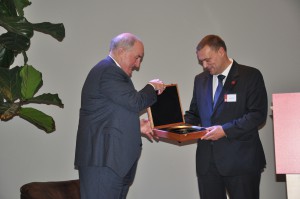
IU alumnus Mark Renner, right receives Distinguished International Service Award from President McRobbie.
About 100 IU alumni and friends excitedly joined in the grand opening celebration. They included Mark Renner, a 1994 IU graduate and Berlin native who came to IU on a German American Exchange Service Scholarship, ultimately earning a master’s degree in journalism. He is president of the Berlin chapter of the IU Alumni Association and was instrumental in helping establish the IU Europe Gateway. For his efforts, Renner was awarded the Distinguished International Service Award by IU Vice President David Zaret.
They also included two alumni of the IU Jacobs School of Music, Berlin-based mezzo-soprano Nadine Weissmann and pianist Andrew Crooks, who treated guests to an inspiring operatic performance following McRobbie’s unveiling of the building’s shiny new plaque.
And they included several current IU students, including a few native Hoosiers, who happily shared stories about what it’s meant to them to have the opportunity to live and learn in one of the most dynamic cultural, historical and political centers of the world. One student described her time in Berlin as “life-changing” and said she looked forward to other students having similar experiences by way of the university’s new gateway office and its many connections around the region.
McRobbie closed his remarks by toasting the new facility and saying, “May all who come here to learn, to teach, to conduct research and to work together do so in the spirit of international cooperation and understanding that the IU Europe Gateway office represents.”
In the coming days, members of the IU delegation will take measure of the new relationships and partnerships that were forged over five busy days in Berlin and the bridges we’ve begun to build here.
For now, however, as we prepare to leave this remarkable and resilient city, one so rich in history and culture, we can take pride in knowing that the legacy of Herman Wells lives on and that the foundation has been firmly established for increased international engagement at IU that will greatly impact the lives of our graduates as they go on to change the world for the better.
Auf wiedersehen, and thank you for reading!
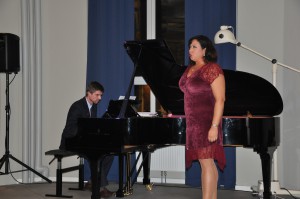
Mezzo-soprano Nadine Weissmann and pianist Andrew Crooks, alumni of the IU Jacobs School of Music, perform at the opening of the IU Europe Gateway.
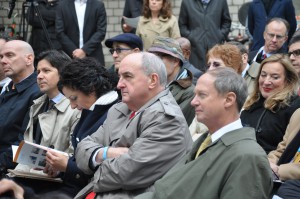
President McRobbie and U.S. Ambassador to Germany John Emerson, far right, at the grand opening of the CIEE Global Institute in Berlin.
Tags: Andrew Crooks, Berlin, CIEE, David Zaret, Free University of Berlin, Freie Universität Berlin, German Universities Excellence Initiative, Germanic Studies, Germany, Global Institute, Grand Challenges, Herman B Wells, IU Alumni Association, IU Europe Gateway, IU Global Gateway Network, Jacobs School of Music, John Emerson, John F. Kennedy, Mark Renner, Michael A. McRobbie, Michael McRobbie, Nadine Weissman, Robert Kennedy, U.S. Ambassador to Germany
Opening doors to and building a better world
While tomorrow’s formal inauguration of the new IU Europe Gateway office promises to be the signature highlight of this busy, weeklong trip to Berlin, IU had the opportunity to share the stage at another major celebration here this afternoon.
Wednesday marked the grand opening of the new Global Institute of the Council on International Educational Exchange, or CIEE, an organization with which IU has partnered for more than four decades. Together, IU and the CIEE have developed world-class educational programs in science, music, languages and culture, and more than 2,500 IU students and dozens of IU faculty and staff have benefited from participating in CIEE programs all across the globe.
The IU Europe Gateway is nestled within the Global Institute, an architecturally impressive complex located in Kreuzberg, one of Berlin’s most culturally diverse and vibrant neighborhoods. Over the last 18 months, CIEE worked to transform a 100-year-old, seven-story factory building, located at the address Gneisenaustrasse 27, or G27, into an interdisciplinary campus, featuring dormitories, classrooms and offices serving up to 200 students, that creatively blends elements of old and new Berlin.
Today, the new facility hosted visitors from around the world who were attending CIEE’s 68th annual conference, which focused on the “reinvention” of study abroad and featured the first-ever university “presidents’ workshop” on this increasingly important subject.
The workshop included presidents from a number of minority serving institutions, as well as IU President Michael A. McRobbie and Martin McCrory, IU associate vice president for diversity, equity and multicultural affairs. Also representing IU were Vice President for Diversity, Equity and Multicultural Affairs James Wimbush and Kathleen Sideli, associate vice president for overseas study and active member of the CIEE Board of Directors.
Before an audience that included leaders of some of the oldest historically black colleges and universities in U.S., McRobbie acknowledged the important role such institutions play in serving as “major gateways” to higher education for many students who are part of under-represented minority groups, are from low-income families and who are often the first in their families to attend college. He also talked broadly about IU’s longstanding commitment to diversity and equity, and the university’s concerted effort to reduce barriers that often make it difficult for low-income and minority students to study abroad. IU is approaching the point where the percentage of minority students who study abroad more closely reflects the minority composition of its campuses, but, as McRobbie noted, the university seeks to increase minority participation in study abroad beyond these recent gains.
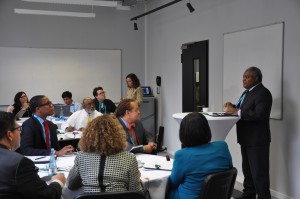
Martin McCrory, IU associate vice president for diversity, equity and multicultural affairs, speaks in Berlin at a summit meeting on increasing study abroad opportunities for minority and low-income students.
Associate Vice President McCrory told summit attendees that he wasn’t able to study abroad until he was in his 30s, but that the experience was ultimately “life changing.” He also talked passionately about his interactions with IU students who have come back from their first overseas travel, in densely populated countries such as China and India, feeling equally inspired, enlightened and culturally aware of those with whom we share the world.
McCrory wrapped up his presentation by describing some specific efforts at IU aimed at ensuring all IU students have the opportunity to study abroad—from raising funds for study abroad scholarships through the university’s new bicentennial fundraising campaign to participating in new endeavors such as the CIEE’s Passport Caravan. IU will be one of the first schools to take part in the program, which encourages students to apply for a passport early in their college career. In partnership with CIEE, IU’s Office of the Vice President for Diversity, Equity and Multicultural Affairs has committed funds to help cover the cost of passport applications for IU students.
“It may not sound like a lot,” McCrory said, “but even just a couple of weeks overseas can change the course of a student’s life.”
The power of international education
Despite the first real Berlin weather IU delegation members have experienced thus far on their trip (jokingly described by several individuals today as “50 shades of gray”), a bright, positive mood permeated the chilly air in the complex’s spacious, outdoor courtyard, where today’s ceremony for the new CIEE Global Institute was held.
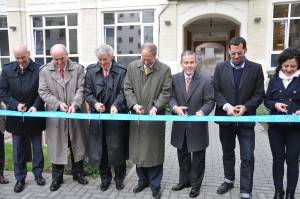
IU President McRobbie, second on left, joins U.S. Ambassador to Germany John Emerson in a ribbon-cutting ceremony for the new CIEE Global Institute.
The head of one of the CIEE’s most “special” partners, as he was introduced by CIEE President and CEO James Pellow, President McRobbie served as one of the main speakers at the grand opening. After congratulating the CIEE on its new global home in Berlin, McRobbie talked about the “power of international education” and the guiding principles for both IU and the CIEE as they seek to provide students with meaningful study abroad experiences.
“Higher education must embrace diversity in the broadest sense,” he said. “For through interaction with others who hold views and perspectives that differ from our own—whose life experiences and customs are vastly different from ours—our minds are opened to new ways of understanding. We comprehend, we empathize, we learn.
“This superb new Global Institute represents the commitment that all of us share to delivering quality educational programs that meet the needs of the 21st century,” McRobbie added. “It represents our shared long-term commitment to international exchange, to the promotion of international understanding and to opening wider the gates of opportunity to students from all backgrounds.”
On a brisk afternoon, McRobbie served to warm up the crowd for the event’s keynote speaker, U.S. Ambassador to Germany John Emerson, with whom the IU delegation expects to meet tomorrow afternoon.
Emerson, who has served in his post for more than two years, amplified what others, including McRobbie, had said before him about the vital importance of study abroad in creating a more globally literate, culturally understanding society. He also eloquently characterized a city in which IU expects to build upon its historic connections and be increasingly engaged.
“No city represents reinvention like Berlin,” Emerson said. “It’s been said that the history of our time has been written in the life of Berlin.”
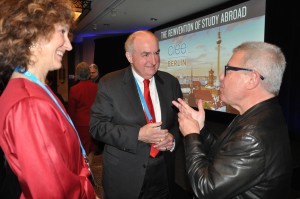
President and First Lady Laurie McRobbie meet with renowned Polish-American architect and artist Daniel Liebeskind.
Finally, several hours after McRobbie, Ambassador Emerson and others took part in the ceremonial ribbon-cutting for the new Global Institute, McRobbie and his fellow IU delegation members had front-row seats for the opening address of the annual CIEE conference, presented by celebrated Polish-American architect and artist Daniel Libeskind. In an inspiring and frequently humorous hour-long talk, Libeskind discussed the design process behind several of his most famous structures, including, among others, the Jewish Museum here in Berlin, the Military History Museum in Dresden, Germany, and the new World Trade Center complex, still under construction in the lower Manhattan section of New York City. He also shared a number of stories and insights into why he, as the son of Holocaust survivors and someone who immigrated to the U.S. as a teenager, believes so strongly in the value of enhancing our global literacy and cultural understanding.
In one of the funnier moments of his talk, Libeskind recalled having to defend his design for the Jewish Museum to a German government official who had assumed his post after the fall of the Berlin Wall in 1989 and only a year after Libeskind had won an anonymous competition for the new museum’s design. At that point, Libeskind was a relative unknown, with no major projects to his name.
As Libeskind recalled the story, the government official pointedly asked the aspiring architect, then in his early 40s and struggling to launch his career, what successful projects he’d designed in the past. Libeskind was quick to craft the perfect rejoinder. “If Germany wants to continue to focus on the past,” he calmly told his interviewer, “it will never have a future.”
Indeed, Libeskind’s talk—a fitting close to a full day of memorable activities in Berlin—offered many reminders of the importance of looking forward, while still honoring the past, in an increasingly interconnected world.
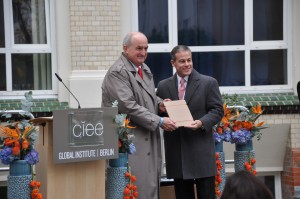
President McRobbie receives a cardboard etching of the new Global Institute from CIEE President and CEO James Pellow.
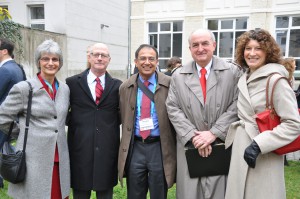
President McRobbie and members of the IU delegation meet up with an old friend at the Global Institute grand opening, former dean of the College of Arts and Sciences at IU Bloomington Kumble Subbaswamy, pictured at center.
Tags: Berlin, CIEE, Council on International Educational Exchange, Daniel Libeskind, Equity an Multicultural Affairs, Germany, Global Institute, IU Bicentennial Strategic Plan, IU Europe Gateway, IU Global Gateway Network, James Pellow, James Wimbush, John Emerson, Kathleen Sideli, Kreuzberg, Martin McCrory, Michael McRobbie, Office of the Vice President for Diversity, OVPDEMA, Passport Caravan, U.S. Ambassador to Germany
History and harmonious connections
Members of the Indiana University delegation began day two of their weeklong trip to Germany by traveling to Berlin’s oldest university, where they glimpsed several new possibilities for strengthening IU’s already deep connections with one of Europe’s most dynamic cultural, economic and political centers.
The Humboldt University of Berlin in Mitte, Berlin’s most central borough and one of two boroughs that span the former east and west districts of the city, was founded in 1810 as the University of Berlin, just 10 years before IU’s inception, by the Prussian philosopher and linguist Wilhelm von Humboldt. In 1949, it was renamed Humboldt University in honor of Wilhelm and his brother, Alexander, a geographer and explorer.
Today, large marble statues of the two brothers adorn the entrance to one of Europe’s most prestigious universities and one of the world’s most acclaimed centers for education in the arts and humanities. HU, a research-intensive university that has served as a model for several major American higher education institutions, has educated 29 Nobel Prize winners and counts among its scholars and students a who’s who roster of history’s foremost thinkers, including Albert Einstein, Otto von Bismarck and Karl Marx.
A quotation from Marx greets visitors to the main HU building, a former palace of Prince Henry of Prussia (1726-1802). Affixed to the wall in golden letters, it reads: “Philosophers have only interpreted the world in various ways; the point however is to change it.”
The quote, along with signs on the main entry staircase reading “Vorsicht Stufe,” or “Mind the Step,” reflects HU’s main mission as well as its turbulent history. In the early part of the 20th century, HU gained a reputation for shaping the minds of many of Germany’s greatest thinkers and scientists, but like all German universities after 1933, it was seriously impacted by the Nazi regime. Under Nazi rule, hundreds of Jewish professors and employees at HU were fired, and students and scholars opposed to the Nazis were expelled and sometimes even deported. Additionally, tens of thousands of books from the university’s library were burned.
After World War II, the university “reopened” in the Soviet zone of East Berlin once again as the University of Berlin, but now based on a communist model of teaching. The new university was but a shell of itself, with many of school’s former teachers having died or gone missing during the war and its buildings enduring massive damage. Scholars opposed to the school leadership were arrested or deported, thus leading to the movement for a “free university” in Berlin, an effort with which IU’s legendary 11th president Herman B Wells became intimately involved. In 1948, the Free University of Berlin was established.
More than four decades later, following the unification of East and West Germany, the university underwent another major restructuring and renewal process. In the early 1990s, all of the school’s faculty members were dismissed. A third were rehired, thus beginning a lengthy growth process that has taken the better part of the last two decades.
Once again known as Humboldt University, the institution currently educates more than 30,000 students, including 6,000 international students, across nine faculties, or schools. HU and the Free University also jointly operate the largest medical school in Europe, and HU possesses celebrated strengths in, among other areas, law, mathematics, the life, natural and social sciences, and the humanities.
In 2012, HU was one of 11 German universities to win funding in the German Universities Excellence Initiative, a national competition for universities organized by the German government that aims to promote innovative research, strengthen global research cooperation and enhance the international standing of German universities. The award arrived just two years after HU celebrated its bicentennial and began ramping up its effort to become one of the world’s top research universities, one that bridges the traditional divide between the natural sciences and the humanities, while also providing students opportunities to experience other cultures around the globe.
Those back home in Indiana familiar with IU’s new strategic plan as the university fast approaches its own bicentennial (in 2020) might already have picked up on the major similarities between Indiana’s flagship institution and HU. As IU President Michael A. McRobbie explained to the delegation’s hosts, which included HU’s vice presidents for research and academic and international affairs, IU has undergone its own extensive restructuring and renewed its commitment to greater internationalization. This effort has resulted in the establishment of seven new schools, including the School of Global and International Studies; around 8,500 international students annually, about 50 of whom are German; graduating classes with roughly 30 percent of study abroad participants; and three new global gateway offices, including one in Berlin, the IU Europe Gateway, that will be formally dedicated Thursday.
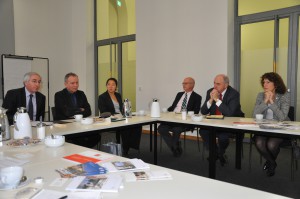
Members of the IU delegation, seated at table on right, meet with senior officials at Humboldt University.
Furthermore, IU has just embarked on its own “excellence initiative” of sorts: a Grand Challenges research program that will lead IU to invest nearly $300 million over the next five years to develop transformational solutions to some of the world’s most pressing problems. The university plans to fund three to five projects between now and its bicentennial year.
As delegation member and IU Vice President for International Affairs David Zaret noted, IU and HU are both “proceeding along parallel paths” in terms of marshaling their scholarly talent to address major world challenges and engaging expertise in both their arts and humanities programs and their professional schools toward meeting their respective university’s lofty ambitions.
Today’s meeting between IU and HU officials generated a number of ideas for exploring potential collaborations between IU and its forthcoming work on Grand Challenges and HU’s ongoing effort to meet the goals of Germany’s Excellence Initiative. Both schools’ officials also recognize the importance of increasing the number of students who study abroad, thus exposing them to other economies and cultures. (About 100 IU students study in Germany each year.)
Indeed, fostering greater multicultural understanding is of great concern in Germany, which, according to recent reports, will take in over a million asylum seekers this year, including thousands of Syrian refugees. As IU President McRobbie commented, IU also has a responsibility, as the state’s flagship university, to diversify its campuses and broaden the global literacy of its students, an issue increasingly important as Indiana continues to experience a major boom within its Hispanic population.
Indeed, to borrow from one HU official, many “interesting connections” between IU and HU are already appearing on the horizon.
A potential creative and cultural collaboration
Harmonious would be a fitting adjective to describe the IU delegation’s final set of meetings of the day — with administrators and faculty at the Universität der Künste Berlin, or Berlin University of the Arts, the largest art and music school in Europe. In its three-centuries-old history, UDK has earned its place at one of the most highly respected arts institutions on the continent and also one of Europe’s most versatile such schools, uniting four colleges specializing in fine arts; architecture, media and design; and music and the performing arts. It is also one of Berlin’s most active cultural centers, offering more than 800 events each year, including many at its College of Music, founded as the Royal Academy of Music in 1869 by Joseph Joachim, a friend of Johannes Brahms.
In news that shouldn’t surprise any Hoosier, IU and UDK had plenty to discuss. In fact, one wouldn’t need a creative arts degree to dream up possibilities for fruitful exchanges between the two universities, including any number of collaborative activities involving IU’s world-renowned Jacobs School of Music or its distinguished programs in Theatre, Drama and Contemporary Dance, Art and Design, Media and film studies.
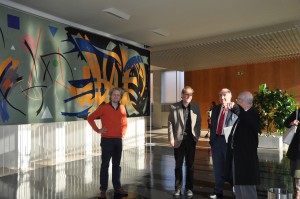
IU President Michael A. McRobbie, second from right, tours the lobby of the performance hall at Berlin University of the Arts.
To that end, IU will soon sign an agreement of friendship and cooperation with UDK, and plans are already underway that could enable chamber-sized groups of IU Jacobs School students to showcase their musical talents here in Berlin, possibly at UDK’s impressive performance hall.
Personally speaking, I would enthusiastically applaud that idea, having viewed, first-hand in the spring, just how meaningful it was for IU student orchestra musicians to get to play at Seoul’s acclaimed Performing Arts Center.
In a little over 48 hours, IU will formally dedicate the new Europe Gateway office in Berlin, where today’s productive meetings offered further proof of IU’s remarkably strong connections with the city and the possibility for even greater engagement across Germany for years to come.
Tags: Berlin, Berlin University of the Arts, David Zaret, Drama and Contemporary Dance, Free University of Berlin, Freie Universität Berlin, German Universities Excellence Initiative, Germany, Grand Challenges, Herman B Wells, HU, Humboldt University of Berlin, IU Bicentennial Strategic Plan, IU Department of Theatre, IU Europe Gateway, IU Global Gateway Network, IU Media School, IU School of Art and Design, Jacobs School of Music, Michael A. McRobbie, School of Global and International Studies, UDK, Universität der Künste Berlin
From Bloomington to Berlin
Walking the streets of bustling Berlin, I was immediately struck by the city’s many visible contradictions, which, for this first-time visitor, contribute to its charm and appeal.
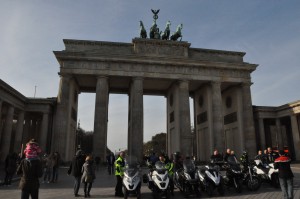
Berlin’s Brandenburg Gate, one of Germany’s best-known landmarks and a symbol of the country’s past and present history.
Berlin’s dazzling cityscape — including its famed Brandenburg Gate and glass dome-topped Reichstag building, as well as its many memorials, museums, monuments, churches and cathedrals — reflects the city’s remarkable, yet often turbulent, cultural and political history.
This centuries-old metropolis is currently one of Europe’s most vibrant and cosmopolitan economic centers. Mixed in with its many impressive modern buildings are older, damaged structures that survived the heavy bombing of World War II and stand as reminders of the devastating consequences of war and other conflict.
Since the fall of the infamous Berlin Wall more than a quarter century ago, in November 1989, Germany’s capital city has undergone a remarkable transformation. Somehow this once-divided city has emerged from dark and difficult times to become a beacon for business and tourism and a leading center for education, science and research.
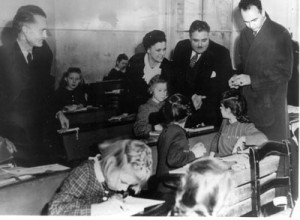
As cultural adviser to American occupation forces in Germany at the end of World War II, Herman B Wells (standing, second from right) worked with students in a German classroom. The picture was taken in 1948.
Contemporary Berlin is, without a doubt, a far cry from the city that Indiana University’s legendary 11th president Herman B Wells visited in the immediate aftermath of World War II. Wells was asked to contribute to the effort to rebuild Germany’s devastated university system, which, until that point in the country’s history, had been one of the greatest in the world.
His work led to the establishment of the Freie Universität Berlin, or Free University of Berlin, which started with a couple thousand students before quickly becoming, to borrow from Wells’ own words, “a powerful influence for freedom and democracy in German higher education for a number of years.” Today, the Free University is one of Germany’s finest educational institutions, and the partnership between IU and Free University, which generated IU’s longest-running graduate exchange program, continues to this day.
Long legacy, new traditions
In just a few days, IU’s 18th president, Michael A. McRobbie, will carry on Wells’ legacy and add a new chapter to the university’s long history of international engagement when he formally inaugurates the new IU Europe Gateway office here in Berlin.
The new office will serve as a central hub for IU’s many educational activities in Europe and is the university’s third such global gateway facility, following the establishment of offices in Beijing and New Delhi. It is located in the Kreuzberg district of East Berlin, which, with its own series of marked contrasts, is a microcosm of cosmopolitan Berlin itself. The neighborhood’s streets, which are lined with graffiti and posters for punk rock performances, offer a striking collection of eclectic shops, ethnic restaurants, art galleries, music clubs and more. And just a few blocks away is Checkpoint Charlie, the most famous of the guarded houses that acted as crossing point between the former East and West Berlin. (Unfortunately, the area around the checkpoint, complete with a McDonald’s, has devolved into a tourist trap not at all like the much more captivating Kreuzberg storefronts.)
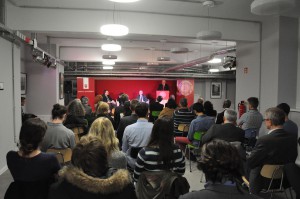
IU President Michael A. McRobbie introduces the inaugural event at the IU Europe Gateway. The event focused on the future of transatlantic data privacy in the aftermath of a major European Court of Justice decision.
With its culture and overall vibrancy, the neighborhood provides a perfect place for IU to deepen its roots in Berlin and in Europe. It also serves as an appropriate backdrop to activities such as this afternoon’s inaugural event at the IU gateway facility: a seminar on transatlantic data privacy featuring U.S. and European leaders in the field of data protection, including IU’s own Fred Cate, vice president for research and distinguished professor.
The discussion also included the respective commissioners from the U.S. and Germany who are most involved in transatlantic data privacy and security debates. Earlier last month, the European Court of Justice invalidated the Safe Harbor framework, a transatlantic agreement that previously enabled companies to transfer data from Europe to the U.S. The court said that highly publicized leaks from Edward Snowden made it clear that American intelligence agencies had almost unfettered access to data about Europeans’ online information, infringing on their rights to privacy.
The court’s ruling has reverberated across the digital economy and has had profound implications for thousands of European and American businesses that exchange data to support trade and jobs. It also has implications for tourism, e-commerce and national security.
The two-hour-long discussion delivered a lively and thought-provoking exchange of ideas on the transatlantic relationship over data privacy and, more generally, gave a glimpse into the types of educational activities the IU Europe Gateway will look to initiate in the months and years ahead under the auspices of academic director and IU Maurer School of Law professor Hannah Buxbaum.
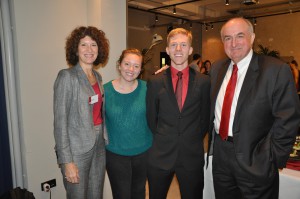
IU President McRobbie and first lady Laurie Burns McRobbie pose for a picture with IU students Christopher Chase and Megan Medellin. Both are studying abroad in Berlin.
Along with the captivating panel discussion, guided by Fred Cate, it was most heartening to see a number of engaged students in the audience, including two IU Bloomington students, Christopher Chase and Megan Medellin, who are studying in Berlin this semester. Chase and Medellin represent two of IU’s newest schools, the School of Global and International Studies and The Media School, respectively, and the two students had an opportunity after the event to talk about their time in Germany with President McRobbie and IU first lady Laurie Burns McRobbie.
In his opening remarks at the inaugural event, President McRobbie described the new office as the “university’s bridge to Germany and all of Europe.”
Today’s event added a small chapter in IU’s storied history of engagement in Berlin. Later this week, when McRobbie and members of the IU delegation to Germany formally inaugurate the new gateway, the university will have further cemented its longstanding connection with a city brimming with character and contradictions that are sure to stimulate the intellectual curiosity of IU students, faculty and staff who experience all that it has to offer.
Tags: Berlin, Christopher Chase, Fred Cate, Free University of Berlin, Freie Universität Berlin, Germany, Hannah Buxbaum, Herman B Wells, IU Europe Gateway, IU Media School, Kreuzberg, Laurie Burns McRobbie, Maurer School of Law, Megan Medellin, Michael A. McRobbie, transatlantic data
Renewing historic ties, beginning new adventures in Berlin
Beginning Monday, Nov. 2, an Indiana University delegation, led by IU President Michael A. McRobbie, will embark on a week-long trip to Berlin, the capital of Germany, one of Europe’s most dynamic centers of economic, political and cultural activity, and a place where IU’s connections run especially deep.
Nearly 70 years ago, another IU president, Herman B Wells, left Bloomington for Berlin, to help the city rebuild a once-proud academic core greatly decimated by war. Wells’ efforts led to the creation in 1948 of the Freie Universität Berlin, or “Free University of Berlin,” today one of Germany’s and the world’s most preeminent universities. Wells work in Berlin also helped set the stage for IU’s remarkable growth in the decades that followed into one of our nation’s most internationally focused universities, engaged with all parts of the world through scholarship and research.
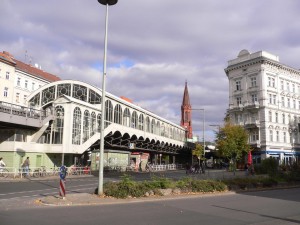
The IU Europe Gateway office will open in the heart of East Berlin in the Kreuzberg neighborhood, an international and cultural center.
The IU delegation will use its time in Berlin next week to renew its half-century-old partnership with Free University and celebrate what is now the university’s longest-running graduate exchange program. It will also introduce and initiate an exciting new venture in Germany: the IU Europe Gateway office, IU’s third such facility for international faculty and student activities, following the launch of similar offices in New Delhi and Beijing.
Located within the new Council on International Educational Exchange Global Institute, in the Kreuzberg District of East Berlin, the new gateway office has been established through the work of IU Vice President for International Affairs David Zaret and his office, which has organized the IU trip to Berlin. The gateway will serve as a central hub for IU activities in Germany and across Europe, enabling the university to better connect with its students, alumni and institutional partners, while also increasing the visibility and impact of its academic and research programs across the continent.
Like the other IU Global Gateway offices, the new facility will support scholarly research and teaching, study abroad programs, distance learning initiatives and alumni events. It will also provide space for conferences and workshops, such as the office’s inaugural event on Monday afternoon, a discussion of transatlantic data privacy and security with some of the foremost experts in the field, including the commissioner of the U.S. Federal Trade Commission, the commissioner for data protection and freedom of information in Berlin, and IU Vice President for Research and Distinguished Professor Fred Cate.
Later that week, on Nov. 6, McRobbie will host a reception with IU alumni and friends to formally open the gateway office. In the spirit of Wells, the celebration will include a performance by two alumni of IU’s world-renowned Jacobs School of Music.
In the middle of those two major events will be meetings with leaders at other top Germany universities and top government officials, including U.S. Ambassador to Germany John Emerson. McRobbie will also speak during the opening session of the annual conference of the Council on International Educational Exchange, the leading U.S. non-governmental international education organization.
I’ll be chronicling IU’s time spent in Berlin, offering first-hand, real-time reports of many of the delegation’s daily activities, sharing information about our historic and growing ties to this important part of the world and offering insights into IU’s ongoing effort to strengthen its international engagement efforts.
I hope you will follow along and check in frequently as I share news, photos and updates, and please feel free to reach out to me directly with questions at rpiurek@iu.edu.
Auf wiedersehen, and more soon from Berlin!
Tags: Beijing, Berlin, CIEE, Council on International Educational Exchange, David Zaret, Fred Cate, Free University of Berlin, Freie Universität Berlin, Germany, Herman B Wells, IU Alumni Association, IU Europe Gateway, IU Global Gateway Network, Jacobs School of Music, John Emerson, Michael A. McRobbie, New Delhi, Office of the Vice President for International Affairs, transatlantic data, U.S. Ambassador to Germany



